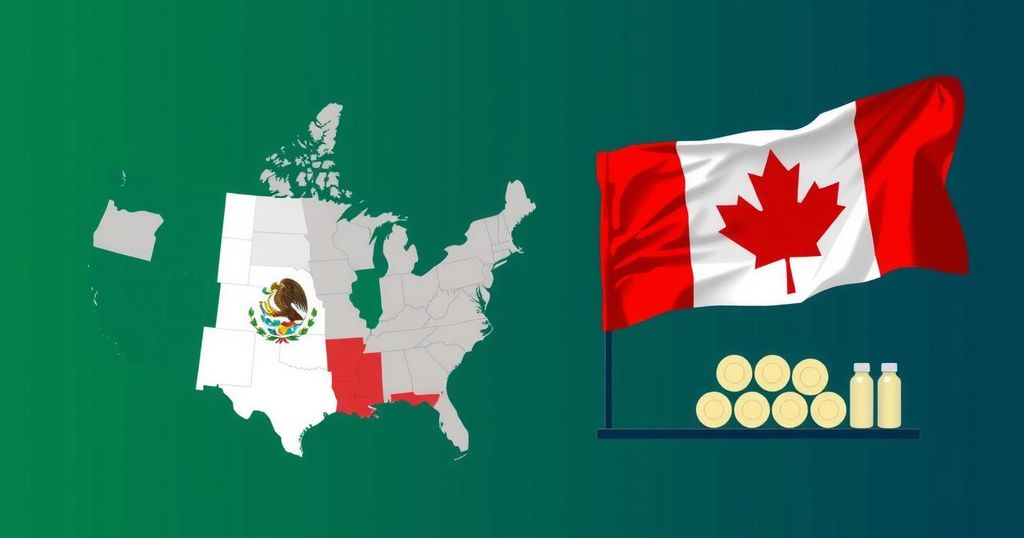The Implications of Trump’s Proposed Trade War: A Shift in Manufacturing Dynamics
President-elect Donald Trump is preparing to launch a trade war affecting key partners—Mexico, China, and Canada—proposing significant tariffs intended to boost domestic manufacturing. However, experts express doubt regarding their effectiveness in relocating production back to the U.S., suggesting that potential shifts may occur to nations such as Vietnam, Germany, and others, while some manufacturers may choose to remain due to existing contracts and cost considerations.
President-elect Donald Trump is poised to initiate a significant trade conflict with key partners, specifically Mexico, China, and Canada, which account for over 40% of U.S. imports. Trump’s proposal involves imposing hefty tariffs, including a 10% additional tariff on Chinese goods and a 25% tariff applicable to imports from Mexico and Canada. While the intent is to stimulate domestic manufacturing, experts suggest that these moves may not substantially shift production back to the U.S., as evidenced by previous tariff implementations that resulted in minimal relocation of manufacturing.
Manufacturers are likely to explore alternative countries in response to new tariffs. Vietnam emerges as a leading option due to its low production costs and increasing export capacity. Other possible contenders for production shifts include European countries such as Germany for automobile manufacturing, alongside nations like Japan and South Korea that possess substantial car production capabilities. For apparel and footwear, opportunities may arise from countries like Indonesia, Bangladesh, and Cambodia, which have already seen a rise in imports by the U.S.
In the electronics sector, countries such as Taiwan and various Southeast Asian nations are positioned to ramp up their output as U.S. companies seek to diversify away from Chinese manufacturing. However, there is caution regarding potential constraints in production capacity should numerous firms decide to relocate to the same area simultaneously. Despite the anticipated shifts in manufacturing, some companies may opt to retain their existing production locations due to contracts or cost-effectiveness related to tariffs rather than the logistics of relocating.
Furthermore, while tariffs have altered trade dynamics, the case of Chinese imports illustrates a nuanced reality; although total imports from China have declined, they remain a significant source for certain goods. Mexico, meanwhile, has seen growth in exports to the U.S., benefiting from tariff exemptions under existing trade agreements. Overall, the implications of tariffs on manufacturing will take time to unfold, with substantial analysis required to predict the long-term impacts on trade relationships and domestic manufacturing.
The prospect of a trade war initiated by President-elect Donald Trump raises crucial questions regarding the future of U.S. manufacturing and import dynamics. With significant reliance on international trade partners such as Mexico, Canada, and China, it is essential to understand how proposed tariffs could influence where U.S. companies may choose to manufacture goods. Historical contexts, such as the previous tariffs during Trump’s initial term, suggest a complex relationship between tariffs and manufacturing decisions. Moreover, companies are faced with the challenge of balancing tariff impacts with production costs, often leading to decisions that may prioritize long-term contracts or existing manufacturing capabilities over relocations.
In summary, the potential for a trade war under President Trump could prompt shifts in manufacturing locations, with Vietnam, European nations, and Southeast Asian countries being prime candidates. However, historical precedents and existing economic factors suggest that significant changes in manufacturing may not happen swiftly or uniformly. Ultimately, companies will need to consider a range of factors, including existing contracts and cost implications, as they navigate the evolving trade landscape amidst elevated tariffs.
Original Source: www.cnn.com




Post Comment